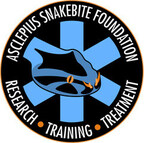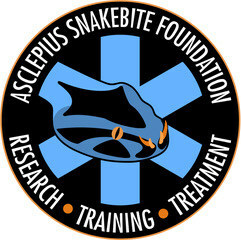Asclepius Snakebite Foundation Leads the Charge in Clarifying Misunderstandings and Promoting Snakebite Awareness
AURORA, Colo., April 18, 2024 /PRNewswire-PRWeb/ -- As March and April mark the onset of snake season in the United States, the Asclepius Snakebite Foundation is stepping forward to address common misconceptions surrounding snakes and snakebite treatment. As an international coalition of physicians, paramedics, and scientists committed to combating the devastating impact of snakebites in the developing world, the Asclepius Snakebite Foundation aims to demystify snakebites and empower communities to take proactive measures.
"It's crucial to dispel myths surrounding snakes and snakebites. Misinformation can exacerbate the risks and hinder appropriate treatment, leading to dire consequences," said Dr. Nick Brandehoff, Executive Director of the Asclepius Snakebite Foundation. "Through education and awareness, we can save lives."
Misconceptions:
1. Buying and Using Snakebite Kits: Contrary to popular belief, snakebite kits are not recommended for treating snakebites. The correct approach involves staying calm, calling 911, keeping the injured part elevated at or above the level of the heart, removing any constrictive clothing, marking around the bite area, refraining from taking medications, and noting the time of the incident.
2. Taking Benadryl after a Snakebite: Taking Benadryl or other antihistamines after a snakebite does not provide effective treatment. Relying on these medications can create a false sense of security and delay seeking proper medical care.
3. Killing Snakes if Seen: Snakes play a vital role in the ecosystem, and indiscriminate killing can disrupt the delicate balance of nature. It's important to exercise caution and avoid harming snakes unnecessarily.
4. Snakes Are Aggressive and Chase Humans: Contrary to popular belief, snakes do not chase humans. Most snake encounters occur when humans inadvertently intrude upon their habitat. Understanding snake behavior can help prevent unnecessary panic and confrontation.
5. All Snakes Are Venomous: In the United States, only a small fraction of snake species are venomous, with the majority being non-venomous and harmless to humans. Understanding the distinguishing features of venomous snakes and practicing caution in areas where snakes are prevalent can significantly reduce the likelihood of snakebites. With just 3-5 deaths attributed to snakebites annually in the US and approximately 9,000 bites reported each year, awareness and preparedness are essential in mitigating the risks associated with encounters with these creatures.
6. Antivenoms Are Not Safe: In the United States, antivenoms are safe and effective treatments for snakebites. Prompt administration of antivenom under medical supervision can significantly improve outcomes for snakebite victims.
The Asclepius Snakebite Foundation urges individuals and communities to support efforts in combating snakebites by spreading awareness, advocating for proper snakebite treatment protocols, and supporting organizations dedicated to snakebite research and education.
To learn more about the Asclepius Snakebite Foundation and how donations contribute to their mission, visit or contact [email protected].
Expert Availability: Dr. Nick Brandehoff is available for interviews, expert commentary, and feature stories to provide invaluable insights into the complexities of herpetology and snakebite treatment. April is the onset of snake season in the United States and there's an urgent need to elevate the conversation surrounding snakebite treatment and prevention.
Media Contact
Nick Brandehoff, MD, Asclepius Snakebite Foundation, 562-325-1664, [email protected],
SOURCE Asclepius Snakebite Foundation



Share this article